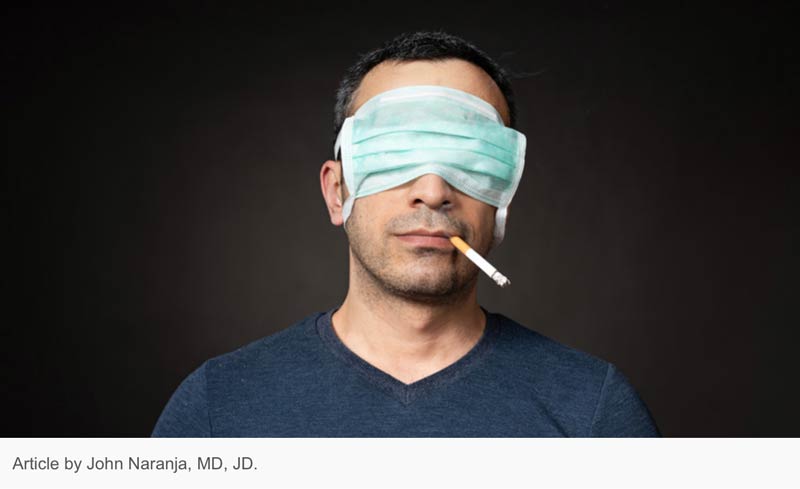
There are an estimated 34.2 million tobacco smokers in the United States. The negative effects of smoking remains well documented. Product liability cases against tobacco companies have also exposed how tobacco manufacturers knew of the harmful effects related to smoking and its addictive effects.
Further, as a theory of liability using consumer protection statutes became employed, successful campaigns against smoking, particularly in the youth, resulted. Recently, however, a debate has ensued regarding the possible benefits of smoking in the context of COVID-19.
Specifically, a hypothesis has been proposed by a physician in Greece who suggests that nicotine may interfere with the way COVID-19 causes a hyperactive immune system. He based this hypothesis on a study yet to be published that of approximately 6,000 patients hospitalized with COVID-19, the rate of smoking was 1.4% to 12.6%. This has been confirmed by another study published in France. This French study evaluated patients admitted to a large French university hospital for COVID-19. Surprisingly, the rate of smoking was significantly lower in COVID-19 patients when compared with the French general population.
In response, the makers of Lucky Strike cigarettes have initiated studies that utilize tobacco leaves to create a potential COVID-19 vaccine. Early findings indicate a positive immune response in pre-clinical trials. The Food and Drug Administration (FDA), responsible for allowing further testing in the U.S. on human subjects, has not yet approved Lucky Strike’s application.
Adding to the confusion, a later meta-analysis (a review of all studies with COVID-19 patients that had data about smoking) performed at the University of California at San Francisco looked at 11,590 COVID patients and concluded that the risk of disease progression for smokers versus non-smokers was nearly double.
Others point to the fact that bringing the fingers close to the mouth during cigarette smoking increases the risk of COVID-19 transmission.
On May 11, 2020, the World Health Organization (WHO) issued a statement regarding tobacco smoking and COVID-19. Their conclusions were:
- COVID-19 is caused by a virus that primarily attacks the lungs or respiratory system
- Tobacco use is a known risk factor for respiratory infections
- Tobacco use has also been associated with the development of coronary artery disease, diabetes, and other respiratory disorders
- More severe forms of COVID-19 infections occur in smokers
- More severe forms of COVID-19 infections occur in those with coronary artery disease, diabetes, and other respiratory disorders
- Research regarding the possible benefits of tobacco use and reducing the risk of COVID-19 require further scrutiny and evaluation before implementing any type of tobacco use in the treatment or prevention of COVID-19
- There is not enough data to support the use of nicotine in the prevention or treatment of COVID-19 at the present time.
Dr. John, Esq. is both an attorney and a physician. Before obtaining his law degree, Dr. John Naranja practiced for approximately 12 years as an orthopedic surgeon.
.
